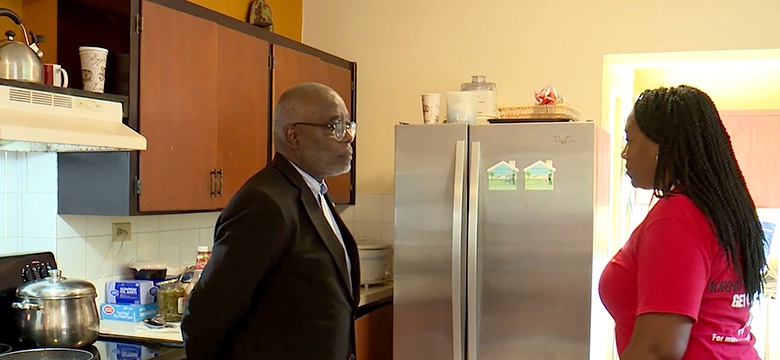
Over the weekend, the Acting Minister of Health the Hon. Neville Tyrrell JP MP joined STAR (Supportive Therapy for Persons with AIDS and their Families) in marking World AIDS Day 2019. The Acting Minister toured the Light House facility and gave the following remarks:
"December 1st, marks World AIDS Day 2019, and I am proud to be here today to unite against HIV - to show support for people living with HIV, to remember those who have died from an AIDS-related illnesses and to thank those organizations who have provided crucial support services for those living with HIV/AIDS and their families.
This year’s theme, “Communities Make the Difference”, is an opportunity to recognize the essential role that communities have played and continue to play in the AIDS response at the international, national and local levels. Communities are the lifeblood of an effective AIDS response and an important pillar of support.
In fact it was Bermuda’s community-based organizations, working in tandem with the Government, who took the lead in this regard during the early 1980’s when AIDS was a relatively new disease and was surrounded by much misinformation and, often, fear:
- S.T.A.R. (Supportive Therapy for AIDS persons and their Relatives) was formed in 1986, providing awareness, education, and sensitivity training for our residents…as well as housing for those living with an AIDS diagnosis; thus we have the Light House.
- The Neverland Foundation provided support to the children of those who were HIV positive…support such as clothing, school necessities, and gifts at Christmas and birthdays.
- Agape House formed in 1990 as Hospice care for persons at the end of life – helping them to die with dignity; at the time they supported many persons with AIDS.
- The Allan Vincent Smith Foundation formed in 1993 and provided education for members of the public wanting to know more about HIV/AIDS.
The only existing organization from that list is S.T.A.R., who continue to provide support to families, community education, Housing (The Light House) and food throughout the year to families in need.
I suppose it’s a good sign that the other helping agencies have fallen away… such organizations are created when there is a need for a particular service. Once that need is met, services and resources can be dedicated elsewhere.
In 2017, Bermuda received a prestigious honour form the World Health Organization as having eliminated Mother-to-Child Transmission of HIV as a public health problem in Bermuda. This would not have been possible without the hard work and dedication of the following key persons within the Ministry of Health who I wish to thank now:
- Dr. Cheryl Peek Ball, Chief Medical Officer
- Ms. Kim Ball, Public Health Nurse, HIV Coordinator
- Ms. Gloria Burgess, Coordinator, Maternal Health & Family Planning Program
- Ms. Dy-Juan DeRoza, Assessment Officer, Epidemiology and Surveillance Unit
- Ms. Susan Jatto, Clinical Laboratory Supervisor, Department of Health
- And Ms. Jennifer Wilson, Nurse Epidemiologist
Thanks to you all.
However, HIV has not gone away, and the Department of Health continues to provide public education so that younger generations have an increased awareness of the risks, and are sensitive to the needs of those living with or effected by HIV.
There are currently around 300 persons known to be living with HIV in Bermuda, ranging in age from under 20 to over 65. Over 70% are men and around 80% of persons living with HIV in Bermuda identify with sexual contact as a risk factor.
I cannot stress enough the importance of getting tested for HIV, if you haven’t already. Do not put it off. . . getting tested is the only way of knowing your status for sure.
Being diagnosed and starting treatment at an early stage ensures that you have a better chance of living a long and healthy life. You can have the test done by your doctor or you can go to the Communicable Disease Control Clinic at the Hamilton Health Centre. Testing at the Communicable Disease Control Clinic is fully confidential and free of charge.
Persons at increased risk of HIV should get tested more often, at least annually, depending on their level of risk. Persons who can be at increased risk include those who have had more than one sexual partner since their last HIV test; persons who have been diagnosed or sought treatment for another sexually transmitted infection; and persons who have sex with a partner with an unknown HIV status.
World AIDS Day is a chance to reflect on how far we have come and it is also an opportunity to focus on raising awareness and understanding of the disease and knowing one’s status, as we stand in solidarity with those living with HIV.
In closing, I would like to acknowledge our Communicable Disease Control team, public health nurses and nurse epidemiologist, who provide care and health counselling to persons living with HIV/AIDS. I personally value what you do tremendously, and it brings me great pride to be part of your dedicated and accomplished team.
Let’s continue to work towards an HIV free Bermuda.
Thank You."
